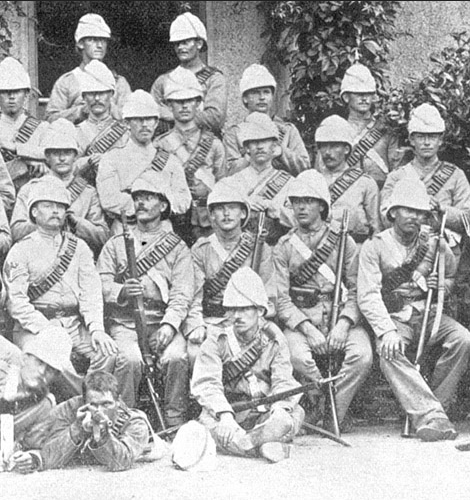I’ve recently been considering the issue of Apostle Paul’s thorn in the flesh. In the past I’ve leaned towards thinking that it was some sort of demonic oppression, but I had recently been coming around to the idea that it might have been a sickness or physical problem. A closer look at the passage in both English and Greek, as well as reviewing some commentaries caused me to move away from that idea. And yesterday, a friend introduced me to a third possibility. But before we get to that third possibility, let’s analyze the other two options.
 While there is significant evidence that Paul may have had problems with his eyesight and/or other physical ailments on occasion, the idea that the “thorn in the flesh”, specifically, doesn’t really make sense from the text of THAT particular passage. The thorn is described as “a messenger from Satan to torment me”.
While there is significant evidence that Paul may have had problems with his eyesight and/or other physical ailments on occasion, the idea that the “thorn in the flesh”, specifically, doesn’t really make sense from the text of THAT particular passage. The thorn is described as “a messenger from Satan to torment me”.
Is a sickness or other physical problem such as bad eyesight ever described as a messenger from Satan anywhere else in the Bible? The Greek for “messenger” (“aggelos”) is usually used in the New Testament to refer to angels, but is sometimes used to refer to human messengers. See here:
(ággelos) is used 176 times in the NT (usually of heavenly angels), but only the context determines whether a human or celestial messenger is intended.
That word refers to John the Baptist in Matthew 11:10 and Mark 1:2-4. It’s used to refer to human messengers sent by John in Luke 7:18-24. James uses it to refer to the Israelites who visited Rahab in James 2:25. So it can clearly be used to refer to human messengers.
But it doesn’t seem to ever be used to describe something related to a physical issue that I’ve seen. Demons are certainly associated with causing physical issues sometimes, but I don’t recall any passage in which a physical ailment is referred to as being caused by a “messenger”. Demons are typically referred to in the Bible using the Greek word “daimonion”.
(daimónion) always refers to demons in the NT – the only exception being Ac 17:18 (which refers to heathen gods)
If it were a demon causing a physical ailment, why not just say it was a “daimonion”? Paul was familiar with the term, having used it in I Corinthians 10:20-21 and I Timothy 4:1. Yet Paul didn’t use it to describe his thorn.
So there are two obvious problems with the thorn being a physical issue.
The eye problem/ailment theory seems to be based on other passages like:
“See with what large letters I am writing to you with my own hand…”. (Galatians 6:11)
and
“You know it was because of a bodily ailment that I preached the gospel to you at first…”. (Galatians 4:13).
But note that Galatians 4:13 literally says, “weakness of the flesh”, so even that isn’t conclusive that it’s an eye problem or sickness, although the next verse where Paul says, “though my condition was a trial to you, you did not scorn or despise me…”, which sounds like a sickness which required significant health care from them.
 But what basis do we have for concluding that those two passages in Galatians are related to the “thorn in the flesh” passage in 2 Corinthians? There doesn’t appear to be much connecting them in phrasing or anything like that.
But what basis do we have for concluding that those two passages in Galatians are related to the “thorn in the flesh” passage in 2 Corinthians? There doesn’t appear to be much connecting them in phrasing or anything like that.
The “large letters” could simply refer to the fact that Paul was writing that letter with his own hand rather than using an amanuensis (person who takes dictation) as he had done with others… and that the letter itself or the section Paul was writing himself was longer than he normally wrote himself.
In II Thessalonians, Paul stated:
“I, Paul, write this greeting with my own hand.”
Colossians:
“I, Paul, write this greeting with my own hand.”
Philemon:
“I, Paul, write this with my own hand…”
There would be no need for Paul to say that unless it was unusual for him to write by his own hand. As such, it is clear that Paul often used an amanuensis to write for him as he dictated, which was a common practice at the time – and remains a common practice in some fields today.
Dr. Michael S. Heiser comments on that issue :
“When Paul alludes to the fact that he’s written something in the letter in his own hand, whether it’s that verse or a few verses associated with it, that highlights the fact that he used an amanuensuis for most of what he wrote. In other words, he dictated his letters. Someone else was the actual writer and Paul verbally dictated the letters… it was actually very common even for literate people in the ancient world to do it this way.”
As noted above, it is STILL a very common way for highly literate people to write. A lot of attorneys (older ones especially) dictate letters and motions on recording devices, then let their secretaries type. And a lot of attorneys use speech recognition software such as Dragon Naturally Speaking to take their dictation. A relatively small number of attorneys actually type/write their own documents. I understand that physicians do a lot of dictation, as well.
Dr. Heiser continues (emphasis added):
“These passages demonstrate that Paul’s Greek education was (at the very least) sufficient enough that he could write formulaic greetings and short phrases in the text… You say, “Who cares?”.
… Because it’s unusual…. about 10% of the people in Paul’s world at the time could read and write. That sounds really, really, really low. And it was. It’s not that everybody’s a dunderhead. It’s just that this is an agrarian culture. There’s a lot of servants and slaves in the culture. This is the Roman empire. So there are a lot of professions and cultural situations where reading and writing was not necessary at all… it just wasn’t part of life. Studies have put the number at 10%, and even the people who are doing the study say it’s probably a little generous…
So if Paul was capable [of writing a whole book like Philemon] (and it seems you can build a good argument from Philemon 19, and there are scholars who have)… if Paul could do that – if he could write the whole letter himself – that means he was in the upper echelon in terms of education. He could certainly do it in Hebrew and Aramaic. Those would be his native tongues, and of course he’s going to know Hebrew really well as a Pharisee. “Pharisee of the Pharisees.”
And now Greek… He was quite possibly not only trilingual, but he could write in all three langauges, as well, which would have put him really in a very small percentage of people in the ancient world. It would have really elevated his status – people who could both read and write [in three languages]. Apparently he could do all that.
Now he still uses an amanuensus, but when he does that it doesn’t mean that he’s not capable. And there’s an interesting parallel to this of a well-known person: Josephus. Josephus actually tells us in his own writings (Against Apion 1.9.51) that he needed help when composing Greek. Now from what we know about Josephus, he’s probably really versed in Aramaic because he’s Jewish, but he’s also employed by the Romans so he’s probably really good in Latin, too. But he confesses he needed a little help to learn Greek well enough to write in it, because that’s what Josephus is written in – Greek.”
Lots of additional discussion re: Paul’s use of an amanuensis here on a bunch of the learned commentaries.
So it appears that it is not very likely that the thorn in the flesh was a physical problem of some sort.
If it’s not, that leaves other two options, the first of which is that a demon messenger was tormenting Paul. A scholarly paper supporting the demon messenger theory can be found here.
Excerpt from the conclusion (emphasis added):
“It seems that a biblical worldview, with its inherent embrace of the supernatural, suggests that one must be open to the idea that Paul’s thorn was a personal demonic entity opposing him. The terminology was examined and it was revealed that there is ample biblical precedent that “thorn in the flesh” is used metaphorically but no evidence that “messenger of Satan” is meant figuratively. It was argued that metaphors usually refer to a concrete and known item and it is most unlikely that Paul strung two metaphors in a row with no referent. Naturalistic theories lack explanatory scope and were revealed to be inadequate. Many examples of God’s providential use of Satan and demons were discussed. Analysis was offered and it was revealed to be consistent with God’s overall purpose of character development. The role of supernatural forces and spiritual warfare merits further study. It seems that Satan and demons seek to cripple the church by division, stall the mission of evangelism, and persecute individuals. Yet in all of these malicious disruptions, God’s grace and providential sovereignty overrides, employing them to sanctify the believer, defeat the wicked, and ultimately show His glory.”
That sounds pretty strong, and a more extensive review of that paper and other related research will appear rather convincing. However, I find the as-yet-unmentioned third option to be the most likely, given the context of the thorn in the flesh passage and other New Testament passages.
That third option is: That a human messenger was sent by Satan to torment Paul. Upon researching and considering the issue, I find it rather compelling. For example (emphasis added):
“What’s telling here is that Paul’s entire discussion in Chapter 11 (just before he mentions the thorn in the flesh) is about his “weaknesses.” In that chapter, Paul gives us a robust list of hardships that he endured for the gospel.
At the end of the list, he refers to these hardships as “weaknesses” (see 11:30). This is the same Greek word that’s used for “weaknesses” in 12:5 and 12:9-10.
In addition, Paul begins his argument in chapter 11 by talking about the “false apostles” and “deceitful workers” who transform themselves as angels of light. He goes on to say that even Satan disguises himself as an angel of light (11:14)…
Paul tells us that these “false apostles” are “servants” of Satan. That is, they are messengers of the devil, doing his bidding. They masquerade themselves as messengers of light just as Satan does. They traffic in slander, innuendo, misrepresentation, and defamation (see 12:10; Paul calls this the “evil report” in 2 Cor. 6:8). They also bring persecution.
Right after Paul talks about his thorn in the flesh, he brings up the false apostles again saying:
I have made a fool of myself, but you drove me to it. I ought to have been commended by you, for I am not in the least inferior to the “super-apostles,” even though I am nothing (12:11).
Consequently, if we read Chapter 11 to Chapter 12 as a discussion about Paul’s weaknesses in which he is boasting, we begin to make better sense of what Paul’s thorn is all about…
In the Old Testament, the term “thorn” is used as a metaphor for a person or group that persecutes God’s people:
But if ye will not drive out the inhabitants of the land from before you; then it shall come to pass, that those which ye let remain of them shall be pricks in your eyes, and thorns in your sides, and shall vex you in the land wherein ye dwell (Numbers 33:55; see also Joshua 23:13 and Judges 2:3).
In this context, God’s enemies are called “thorns” in Israel’s sides (flesh) that “vex” and torment them. These “thorns” were human beings inspired by God’s enemy.
When we read the New Testament in a narrative way, taking it in its chronological sequence, we discover that everywhere Paul planted a church, a group of detractors opposed his ministry and sought to discredit his apostolic authority in the eyes of the Christians for which he cared.
In Galatians, Paul indicates that this group of detractors was headed up by one man in particular…
At the end of the letter, Paul says something interesting:
From now on let no one cause trouble for me, for I bear on my body the brand-marks of Jesus.
You can almost hear a prayer behind this statement in which Paul is asking the Lord to remove this person who is troubling him and the churches.
Putting all of this together, an interesting picture emerges.
Paul’s thorn appears to be a man (inspired by Satan) who was obsessed with discrediting Paul and his ministry.
This man followed Paul wherever he traveled, beginning in South Galatia (Acts 14ff.). He was from the church in Jerusalem, most likely an ex-priest or an ex-Pharisee. And he sought to subvert Paul’s gospel and undermine Paul’s work.
This “messenger” or “servant” of Satan was in league with a group of others who followed him (Galatians 1:7; 5:12). They followed in Paul’s footsteps to the churches in Galatia, probably Thessalonica, and then to Corinth (he possibly could have been the leader of the “super-apostles” that Paul mentions in 2 Corinthians 11).
On three occasions, Paul asked the Lord to remove this person from his life. For he was a torment, a frustration, a harassment to Paul and his work.
But the Lord answered and said that His grace is sufficient. The Lord didn’t remove the thorn. He instead caused Paul to forebear it.”
“Q: If the thorn was the Judaizers, why didn’t Paul just identify it as such?
A: If the thorn was “bad eyes,” why didn’t he identify it as such? It seems to make more sense for Paul to be discreet in mentioning the troubling Judaizers, so as not to give them the satisfaction of knowing that they were hurting Paul and impeding his work.
Note: “Thorns” in the Bible: Num. 33:50-55; Josh. 23:8-13; Jud. 2:1-3; 2 Sam. 23:5-6; Ezk. 2:6; Luke 6:44; Heb. 6:8-9″
More.
Conclusion: Based on the evidence I’ve viewed thus far, if I had to rank the likelihood of each of the three theories presented here, I’d rank them most to least likely:
1: Human messenger/Judaizer;
2: Demon messenger;
3: Sickness/physical problem.
I’d consider the sickness/physical problem significantly less likely than the other two.










5
In my self study with the help of God Sprit. The thorn in the flesh reffering to the human behavior or human self habit.
As we proclaim that we are belong to His children aside of many aspect in our Christian life. We sometimes or many times are experiencing the thorn in our flesh. We dont want to do that and this despite of strong convictions arouse in our spiritual being. We are eager to stand in the ground pertaining to our Chhristianity. But this thorn in our flesh are too strong not to sometimes to avoid to be with.
Pls reply me thank you.